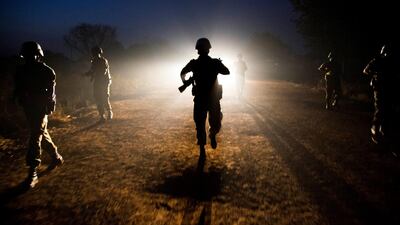The UK’s aid watchdog says there is “limited evidence” the British government’s £3.8m ($4.9m) projects to tackle sexual abuse by peacekeeping troops is having an effect.
The number of reports to the UN of sexual exploitation and abuse rose by a third last year.
The Independent Commission for Aid Impact has conducted a review, which was published on Wednesday, into UK efforts to tackle sexual exploitation and abuse by UN peacekeepers.
It reveals that despite the millions being spent on projects between 2014 and 2019 to train thousands of peacekeepers, including soldiers, police and civilian personnel, there is no evidence to show it has been a success.
The review also criticises the UK for failing to invest in programmes to help victims.
“The ICAI found that the UK government has been a leading voice in tackling the problem, raising awareness internationally of the standards expected of troops, and funding small-scale aid projects designed primarily to drive forward UN reform,” it said.
“However, there was limited evidence that this work had led to reductions in abuses, and there had not been enough focus on working with survivors and vulnerable communities.
“The UK’s efforts to train peacekeeping troops appear useful and important, helping to shift the knowledge and understanding of peacekeepers before they are deployed.
"However, considering the level of training taking place, it is striking that more efforts were not made until very recently to track the results of the training.”
Britain’s endeavours to tackle abuse were supported by aid projects managed by the former Foreign and Commonwealth Office, the report said, mainly in the form of funding for UN reform initiatives and training programmes for international peacekeepers run by the Ministry of Defence.
One initiative has seen international peacekeepers given No Excuse cards to carry at all times, setting out the standards expected of them.
The cards, a result of a key initiative in 2017, contain a concise list of UN rules and prohibitions relating to sexual exploitation and abuse.
UK aid funding has also contributed to a UN-wide Clear Check system for tracking allegations against UN staff, ensuring those dismissed for breaches cannot take new jobs in the UN system.
Additional funding was spent by the ministry’s British Peace Support Team to train more than 10,000 peacekeeping troops each year, with soldiers taught how to identify, report and prevent abuse.
The commission said the training scheme showed “promise”, but it noted that the team did not track trends in reporting abuse when troops had been posted, and did not gather evidence of long-term changes in practice.
The review concluded it was “impossible” to gauge the impact of the training, and there is no evidence yet of a reduction in cases of abuse in peacekeeping.
“The UK’s efforts in this area have been prominent compared to other member states, and its achievements are important and useful,” ICAI chief commissioner Dr Tamsyn Barton said.
“But with survivors facing significant and daunting barriers to obtaining justice, there should be a greater focus on their needs.
"And the government should do more to link up its learning on what works across all forms of conflict-related sexual violence, in order to build an integrated body of evidence that all departments can use.
"These steps would help the UK to have more impact in tackling this persistent and widespread problem.”
The review has also raised concerns over the ability to prosecute abusers.
“Legal and practical barriers, such as peacekeepers being immune from prosecution by the country in which they are based and different legal standards across countries, mean effective investigation is difficult and prosecutions are infrequent,” the report said.
“Given the climate of impunity, achieving changes in behaviour in peacekeeping missions is likely to be a long-term endeavour.”
It has recommended that the UK government should ensure efforts to improve discipline among peacekeepers are balanced with measures to promote the interests and welfare of survivors.
It has also advised Britain to aim for “closer integration and sharing of learning” between its efforts to tackle abuse in international peacekeeping and its wider work on conflict-related sexual violence.
“The UK government could certainly do more to contribute to systematic learning efforts on how best to overcome the entrenched cultural and bureaucratic barriers to preventing abuses in international peacekeeping and achieving justice for survivors,” the report said.
Last year, the UK’s Department for International Development announced it would spend about £40m until 2023 on tackling abuse in the aid sector.
“We were informed by DFID that while much of this sum has been allocated, it has not yet been spent and most of the programming has not yet started,” the review said.
“DFID also confirmed that the vast majority of this spending will focus on safeguarding in the aid sector broadly speaking, and will not be specific to abuses in international peacekeeping.”


